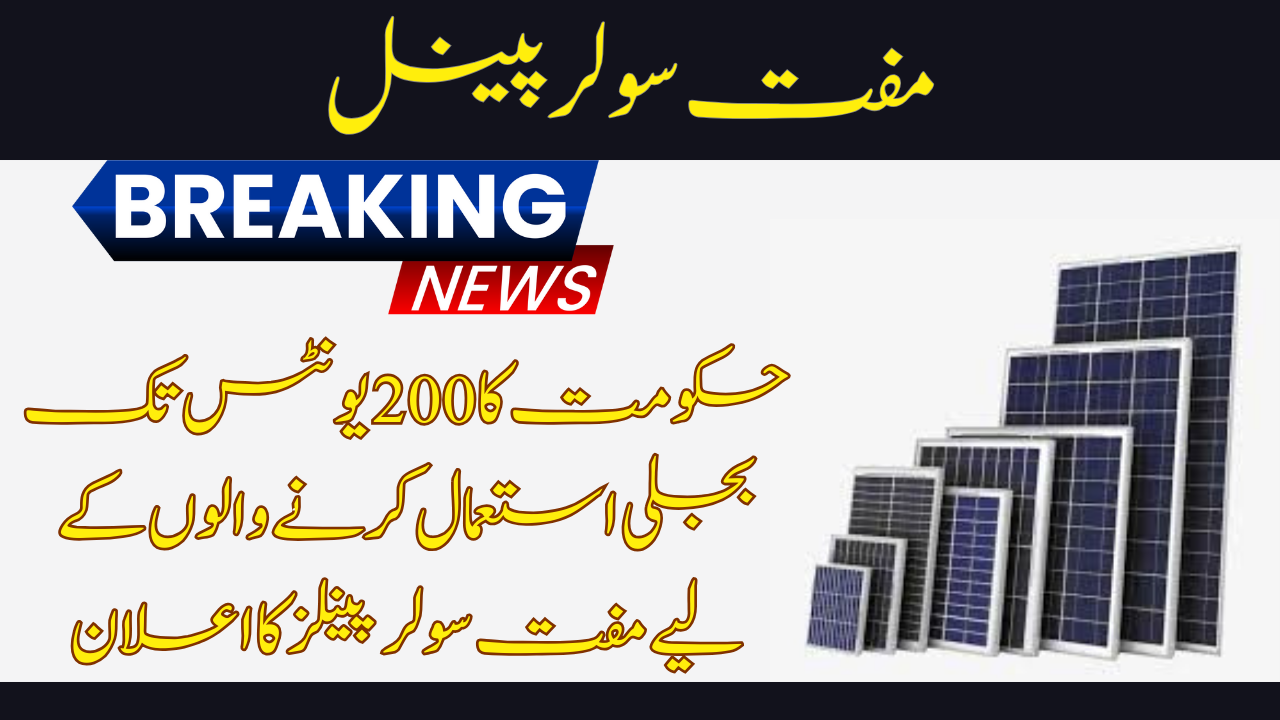Government’s Announcement of Free Solar Panels
In a significant move towards sustainable energy solutions, the government has announced a new initiative to provide free solar panels to households consuming up to 200 units of electricity per month. This program aims to alleviate the energy burden on low-income families while promoting renewable energy usage, reducing electricity bills, and contributing to environmental conservation.
Introduction
With rising electricity costs and the urgent need for sustainable energy solutions, the government has taken a commendable step to support low-income households by providing free solar panels. This initiative is part of a broader strategy to enhance energy security, promote renewable energy sources, and reduce the carbon footprint. The program targets households with lower electricity consumption, ensuring that those who need financial relief the most can benefit from reduced electricity bills and more stable power supply.
Objectives of the Program
- Promote Renewable Energy: Encouraging the use of solar energy to reduce dependence on non-renewable energy sources.
- Alleviate Financial Burden: Reducing electricity bills for low-income households.
- Environmental Conservation: Reducing carbon emissions and promoting eco-friendly energy practices.
- Energy Security: Enhancing the stability and reliability of the power supply to low-consumption households.
Eligibility Criteria
To qualify for the free solar panel program, applicants must meet the following criteria:
- Electricity Consumption: Households must consume up to 200 units of electricity per month.
- Residential Status: The program is available to permanent residents of the country.
- Income Level: Priority is given to low-income families.
- Electricity Bill History: Applicants must provide recent electricity bills to verify their consumption levels.
Application Process
The application process for the free solar panel program involves several steps:
- Registration: Interested households need to register for the program through the official government portal or designated offices.
- Documentation: Applicants must submit necessary documents, including proof of residence, recent electricity bills, and income certificates.
- Verification: Government officials will verify the submitted documents and electricity consumption history.
- Approval: Eligible applicants will receive confirmation of their approval for the program.
- Installation: Approved households will have solar panels installed by authorized service providers.

Benefits of the Program
- Cost Savings: Households will experience significant reductions in their electricity bills.
- Reliable Power Supply: Solar panels provide a stable and reliable source of electricity.
- Environmental Impact: Reduced carbon footprint and promotion of renewable energy.
- Energy Independence: Households become less dependent on the national grid.
Challenges and Solutions
- Initial Costs: Although the panels are free, installation costs may be a concern. The government is considering subsidies or covering installation costs.
- Maintenance: Households may need guidance on maintaining solar panels. Training programs will be provided.
- Awareness: Not all eligible households may be aware of the program. Outreach campaigns will be conducted.
FAQs
1. What is the free solar panel program?
The free solar panel program is a government initiative to provide solar panels at no cost to households that consume up to 200 units of electricity per month. The aim is to promote renewable energy, reduce electricity bills for low-income families, and contribute to environmental conservation.
2. Who is eligible for the program?
Eligibility criteria include households that consume up to 200 units of electricity per month, permanent residents of the country, and low-income families. Applicants must also provide recent electricity bills to verify their consumption levels.
3. How can I apply for the program?
Interested households can apply for the program through the official government portal or designated offices. The application process involves registration, submission of necessary documents, verification by government officials, and approval.
4. What documents are required for the application?
Applicants need to submit proof of residence, recent electricity bills, and income certificates as part of the application process.
5. How will the installation of solar panels be carried out?
Approved households will have solar panels installed by authorized service providers. The government may cover installation costs or provide subsidies to ease the financial burden on households.
6. What are the benefits of having solar panels installed?
Benefits include significant reductions in electricity bills, a reliable source of power, reduced carbon footprint, and increased energy independence.
7. Are there any costs involved for the households?
The solar panels are provided free of charge. However, there may be some installation costs, which the government is considering covering or subsidizing.
8. How will the government verify my eligibility?
Government officials will verify eligibility through the submitted documents, including electricity bills and income certificates. The verification process ensures that only eligible households benefit from the program.
9. How long will it take to get approval and installation?
The timeline for approval and installation may vary based on the number of applications and the verification process. Households will be informed of their approval status and installation schedule in due course.
10. What should I do if I face issues with my solar panels after installation?
Households can contact the authorized service providers or designated government helplines for support and maintenance issues related to their solar panels.
11. How does this program contribute to environmental conservation?
By promoting the use of solar energy, the program reduces dependence on non-renewable energy sources, thereby lowering carbon emissions and contributing to environmental conservation efforts.
12. Will the program be expanded to include households with higher electricity consumption?
Currently, the program targets households consuming up to 200 units of electricity per month. The government may consider expanding the program in the future based on its success and available resources.
13. How can I maintain my solar panels to ensure optimal performance?
Households will be provided with guidelines and training on maintaining their solar panels, including regular cleaning and monitoring for any issues.
14. Is the program available nationwide?
Yes, the program is available to eligible households across the country. Specific details on regional implementation may vary based on local administrative procedures.
15. Can I apply for the program if I am a tenant?
The program is primarily aimed at permanent residents. Tenants may need to coordinate with their landlords to apply for the program and install solar panels on the property.
16. What types of solar panels will be provided?
The government will provide high-quality, efficient solar panels suitable for residential use. Details on the specifications of the panels will be made available to approved households.
17. How will this program impact the national grid?
The program is expected to reduce the load on the national grid by promoting decentralized energy production through solar panels. This can lead to a more stable and efficient power supply system.
Are there any training programs available for households to learn about solar energy?
Yes, the government plans to conduct training programs to educate households on the benefits of solar energy, proper maintenance of solar panels, and ways to maximize energy efficiency.
What measures are in place to ensure the quality of installation and service?
Authorized service providers will be responsible for the installation and maintenance of solar panels. The government will monitor the quality of service and address any issues reported by households.
20. How does this initiative align with the government’s broader energy policy? The free solar panel program aligns with the government’s commitment to promoting renewable energy, enhancing energy security, reducing carbon emissions, and supporting low-income families.
Conclusion
The government’s initiative to provide free solar panels to households consuming up to 200 units of electricity per month is a progressive step towards sustainable energy solutions. By alleviating the financial burden on low-income families, promoting renewable energy, and contributing to environmental conservation, this program has the potential to create a significant positive impact on the lives of many households. Through effective implementation, widespread awareness, and continued support, the program can serve as a model for future energy initiatives aimed at fostering a more sustainable and equitable energy landscape.
